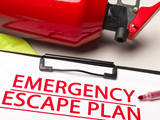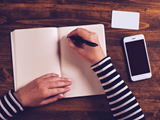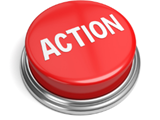
The chances of being caught up in a major emergency are low, but you need to be ready in case it does happen.
By knowing what to do before, during and after an emergency, you can reduce the impact on yourself and your family, your home, your pets and even your belongings. You can also reduce the impact on the wider community, so it really does make sense to be prepared.
Before an emergency
- Know your risks by learning about the kinds of emergencies that could happen in your area.
- Complete a Household Emergency Plan print it out and keep it somewhere safe, so you have all of the information you will need to help you leave your property quickly and calmly.
- Prepare an Emergency Contact List print it out and keep it with your emergency plan.
- Pack an emergency Grab Bag so you have all your basic necessities to hand if you need to leave your home quickly.
- Make sure you know how and where to turn off your electricity, water and gas supply. Make a note of this in your emergency plan, in case someone else needs to know how to do it.
- Ensure that you have adequate and up-to-date home insurance. If you are in a flood area, make sure this is covered.

Visit our Advice and Tip (link here) section to get all of the tools and templates you need to prepare yourself, your family and your home.
Make sure that you keep digital and printed copies, just in case you cannot access electrical devices or if a printed copy becomes wet or damaged during the emergency.
During an emergency
Go in, stay in, tune in
If you are close to an emergency incident or believe you may be in danger, the best advice is to go in, stay in and tune in:
- Go inside a safe building
- Close doors and windows
- Tune into local TV or radio, or follow emergency services and local authorities online or on social media
- Remain indoors and continue to follow advice until the emergency has passed
If you are in the middle of an emergency, it is important to:
- Make sure 999 has been called if people are injured or if there is a threat to life
- Try to remain calm, think before acting and reassure others
- Never put yourself or others in danger
- Only make necessary phone calls, as networks can get overloaded during emergencies
- Continue following the latest advice, in case things change
If it is safe and possible:
- Check if anyone has any injuries, remembering to help yourself before attempting to help others
- Check that your pets are safe and secure
- Check on vulnerable neighbours

It is important to cooperate fully with the emergency services and local authorities. You must evacuate if you are asked to do so for your safety. They will advise you on where to go, and may provide temporary accommodation, shelter and transport if necessary.
After an emergency
Depending on the incident, recovery can be a long and difficult process, but there are some things you can do to help yourself and others:
- Do not enter a dangerous area until the emergency services tell you it is safe. Your local authority can help with temporary shelter or accommodation if you need it.
- Let your loved ones know you are safe. A telephone hotline (known as Casualty Bureau) may have been opened and is usually the best way to trace missing relatives or friends.
- When returning home, beware of new dangers. If any part of the building looks unstable or unsafe, leave immediately. Debris can be dangerous, so wear protective clothing and footwear.
- If you smell gas, open a window and leave the property immediately. Call National Grid on 0800 111 999 and do not smoke or use any naked flames until you you are sure there is no leaking gas present.
- If electrical appliances have got wet, turn off the electricity at the fuse box, allow appliances to dry and have a qualified professional check them before turning them on.
- If your water is discoloured, cloudy or smells, check with your water supply company before drinking or using water as it may be contaminated.
- Contact your insurance provider. Take pictures of any damage and keep records of repairs and cleaning costs.
- Look for signs of stress in yourself and others. You may be able to access support through your GP or through sites such as the counselling directory.
- Check on vulnerable family, friends or neighbours and consider how you could help them. It might be as simple as contacting their loved ones for them, or ensuring they have food and water.
- Children may feel especially frightened and confused, even if they haven’t been directly involved in an emergency. These reactions may not become evident until sometime after the event.
- Joining support groups can be a useful way to share experiences, deal with stress and gain advice on how to deal with practical issues.
Use the navigation menu on the right to find out how you can prepare the wider community for emergencies.
